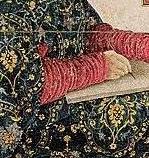|
Malory’s ProseThe 15th century was an age of literary transition, on the one hand looking back to the native
mode while at the same time looking forward to a more literary style. While S.O Andrews has called Malory’s paratactic
style immature, recent critical emphasis has seen that the gaps in this style infact could be seen as strengthening prose,
in invite reader participation.
In this extract the omitting of causal links is effective especially in the part which
describes Lancelot’s wasting away as it emphasises the how ‘he seekened more and more’. On the other hand
there are also elements from the French sources. N.F Blake has called Malory’s alliterative prose, an effect seen here
for example in ‘layed ful lowe’. As McCarthy points out the narrative often falls into units, here ‘this
remembered, of their kyndeness and myn unkindness’. This poetic effect is emphasised by the use of antithesis. As Cooper
has noted Malory’s words often have a proverbial resonance.
Malory’s function as ‘traditional author’
referring to auctoritas emerges in ‘so the frenche book maketh mentcion’. He is concerned to position himself
as historian to Arthur’s court. The limited narrator he utilises is part of this process, sharing only what an observer
would see, focusing on action and speech rather than emotions. However as Cooper has noted psychological conflict emerges
in the clash of ethical systems. Here, ‘he knoweth myn entente’ echoes Elayne’s ‘he made me thereto’
the sense that what is felt so deeply cannot be sin is part of the pathos of a personal voice Edwards sees as the emergence
of subjectivity and a shift from public to private.
It is significant in this sense that the fall of the round table
does not end with the last battle but with Guinevere and Lancelot’s death. Lancelot’s depiction as a saint figure
here can be seen as part of what Benson calls the ‘Christian colouring’ of the end, although the focus on ‘corps’
as well as on the lost glory of Camelot indicates Lancelot’s mind may not be on the ‘synne’ he admits. Yet
there is as Mann has argued a longing for the obliteration of fissures in dm which can be seen here in seeking the lost past
when the knights were ‘togidyirs’.
As Benson has argued Malory’s narrative in contrast to the
traditional distanced medieval narrator is distinguished by a sense of ‘human sympathy’ for his characters.
|

